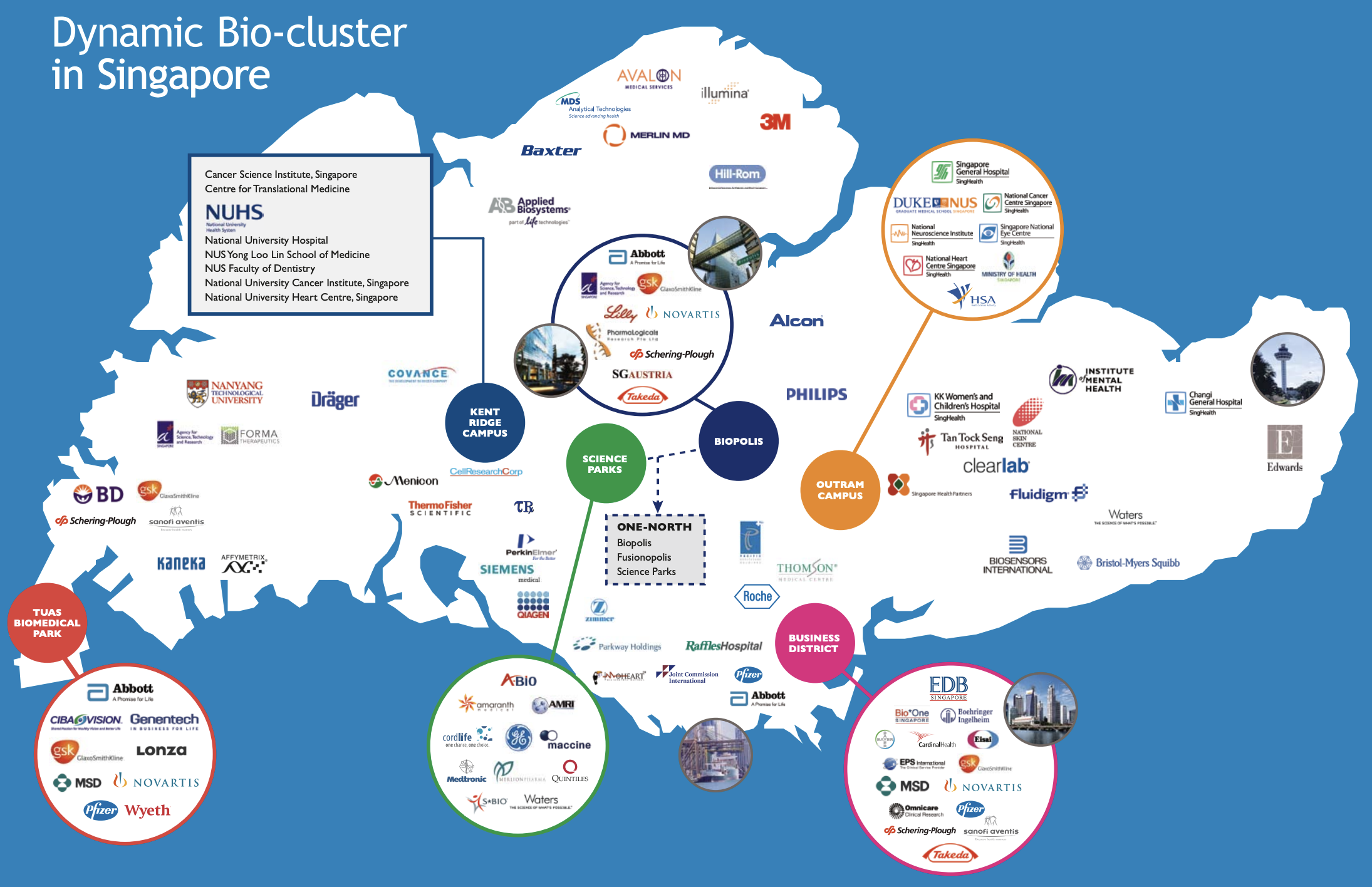Questions about the healthcare sector answered:
- What is Singapore’s healthcare sector?
- Is the healthcare sector stable if you’re considering a mid-career switch?
- What kind of jobs are there in the healthcare sector?
- What’s the salary like?
- What are the growth areas in the healthcare sector?
- What courses or skills are needed to join the healthcare sector?
About Singapore’s healthcare sector
Singapore’s healthcare sector is widely considered one of the best in the world. Ranked second in the world for healthcare outcomes, Singapore’s healthcare system strongly emphasises preventive care. The government has invested significantly in the healthcare system to ensure Singaporeans have access to high-quality medical services.
The Ministry of Health (MOH) operates a network of public hospitals, polyclinics, and community health centres that provide comprehensive medical services to the population.
According to MOH, Singapore spends about 4% of its GDP annually on healthcare, less than the UK (8%) and the USA (16%). Yet, life expectancy at birth in Singapore is higher by two to three years compared to the UK, and its infant mortality rates are among the lowest in the world, approximately half of those of Canada, the UK, and France.
Looking for a new role in healthcare? Explore over 100,000 jobs available on MyCareersFuture now!
Size of the market
The healthcare sector in Singapore exists for an obvious reason: to ensure the physical and mental well-being of Singaporeans, essential for the overall development and prosperity of the nation.
To better meet Singaporeans’ future healthcare needs, as of 2018, Singapore’s public healthcare sector has been regrouped from six regional health systems into a three-cluster system that comprises the National University Health System (NUHS), National Healthcare Group (NHG) and SingHealth.
They operate a range of healthcare institutions and build partnerships among healthcare providers in their respective regions, including acute and community hospitals, primary care providers, nursing homes and other long-term care providers.
Widely regarded as one of the most affordable and efficient in the world, the system provides comprehensive coverage to all citizens and permanent residents.
The Industry Transformation Map (ITM) for healthcare was first launched in 2017. Under it, the MOH laid out its vision to champion a healthy nation given the ageing population, increasing chronic disease burden, slower workforce growth, and rising healthcare costs.
With the launch of the ITM 2025, MOH has placed a stronger focus on transforming the health of Singapore’s population through innovative and sustainable strategies. ITM 2025 focuses on four main areas:
- Strengthening Singapore’s research and innovation ecosystem
- Strengthening digital system enablers
- Attracting and retaining healthcare workers
- Strengthening partnerships
Why is this sector important to Singapore’s economy?
The healthcare sector contributes significantly to the country’s economy, providing jobs and driving innovation and research. Additionally, Singapore has gained a reputation as a medical tourism destination, attracting patients worldwide to receive high-quality medical care at competitive prices.
Singapore’s healthcare system uses a “3M” framework, which stands for Medisave, Medishield Life and Medifund. Medisave is a mandatory national savings scheme that helps Singaporeans save for their future healthcare needs.
MediShield Life provides coverage for hospitalisation and other inpatient treatments and is mandatory for all citizens and permanent residents. It is funded through individual premiums, government subsidies, and a small co-payment for certain services.
MediFund is an endowment fund set up by the Government. It provides a safety net for patients who face financial difficulties with their remaining bills after receiving Government subsidies and drawing on other means of payment including MediShield Life, MediSave and cash.
MediFund Silver and MediFund Junior are carved out from MediFund to provide more targeted assistance for the needy elderly and the young respectively.
Other government-funded programmes that provide additional coverage for specific groups of people include the ElderShield programme for elderly citizens.
Growth areas and outlook of the healthcare sector
Singapore is the region’s healthcare and medical hub. The Joint Commission International (JCI), a non-profit organisation that reviews medical services worldwide, has accredited 13 Singapore hospitals and healthcare facilities.
Located at the centre of Asia’s emerging medical product market, Singapore’s advanced healthcare system is well-managed and highly integrated. Its intellectual property (IP) regime is robust, and IP enforcement is strong. These factors make Singapore an attractive “Living Lab”, where companies can test-bed their most advanced technologies and develop their latest products for Asia and beyond.

Mid-career switch: Why is the healthcare sector a good choice?
According to MOH, various schemes and programmes have been rolled out to attract and recruit fresh local graduates, mid-career individuals and mature workers, and retain healthcare workers in the sector.
In July 2021, a round of salary enhancements was rolled out for all nurses, allied health professionals, pharmacists, and administrative and ancillary staff in the public healthcare institutions and community care sector.
As the healthcare sector turns up the recruitment volume, job opportunities abound.
Speaking in Parliament, Health Minister Ong Ye Kung said that more nurses, allied health professionals and support care staff are needed to operate hospitals, clinics and eldercare centres.
He shared: “They number 58,000 now, and MOH estimates that this will need to grow to 82,000 by 2030.”
Minister Ong also pointed out that by 2030, one in four Singaporeans will be 65 years old and above, up from one in six today. A system to care for the aged, which includes more health and community care services, will require an estimated 30,000 more healthcare workers.
What are the types of jobs, and what is the salary like in the healthcare sector?
Jobs in the healthcare sector are wide-ranging, including roles that are not medically related. As of December 2022, there were about 3,000 available openings from companies in the healthcare sector on the MyCareersFuture portal.
Here are some examples listed on the MyCareersFuture portal:
| Role | Salary Range |
| Marketing Executive | $3,000 to $4,500 |
| Sales and Marketing Manager | $5,000 to $10,000 |
| Clinical Laboratory Manager | $4,500 to $6,000 |
| Patient Service Assistant | $1,800 to $2,300 |
| Clinic Assistant | $1,500 to $2,100 |
| Assistant Manager, Communications (Healthcare) | $3,800 to $4,800 |
| Product Manager | $3,500 to $5,000 |
| Therapy Assistant | $1,700 to $3,000 |
| Call Centre Officer | $1,800 to $2,200 |
| Dental Assistant | $1,800 to $2,400 |
What courses or skills are needed to join the healthcare sector?
Roles in healthcare require specialised training, but jobseekers or mid-career switchers lacking in healthcare background but keen on joining the healthcare sector can up their chances of landing a job by upskilling themselves.
WSG has Career Conversion Programmes (CCPs) with On-the-Job Training for the following job roles in healthcare:
- CCP for Allied Health Professionals
- CCP for Enrolled Nurses
- CCP for Registered Nurses – Degree
- CCP for Registered Nurses (Diploma)
If you need professional advice on navigating your career journey, register here to speak to a career coach!
Here are some useful reads to help you learn more about the sector.
Salary Guide Singapore 2023: Nursing (Public Healthcare)
How a Mid-Career Switch to the Healthcare Sector Can Be Rewarding
7 Most Lucrative Jobs in the Healthcare Sector in Singapore
How to Land a Job in Healthcare: 3 Tips From an Industry Veteran
Want to Be a Healthcare Worker in Singapore? These Interview Questions Can Help
A Guide to Writing an Impactful Resume For Nurses [With Templates]
11 Nursing Specialisations to Consider (and Popular Myths Debunked)
Top 6 Reasons To Choose Pharmacy As Your Career
4 Digital Skills to Level Up Your Healthcare Career
Stronger Together: Celebrating Our Healthcare Heroes
![]()














